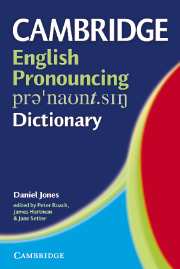j4mes_bond25
Member
- Joined
- Dec 29, 2005
- Member Type
- Student or Learner
YTG said:jenn21, what is your level? What dictionary are you using? I am guessing from your name that you are in university level. Well, if you are intermediate to advanced I strongly recommend you (and everyone):
1. http://dictionary.cambridge.org/. I think it's the best. It got phonetic symbols for both British and American ways of pronounciation. It's web-based so you can look up vocabulary anywhere in the world.
2. if you want to hear the real voice on computer, get the Cambridge Advanced Learner's Dictionary CD-ROM:


You can get the Book+CDROM version or CDROM-only version. I suggest you get the Book+CDROM as the prices are not much different. Trust me, it's gonna be a good investment. We are not taught to pronounce properly in school. This is our real weak point. Also we mix British and American pronounciation. In school, most use British pronounciation mixing with a bit of American. But in real life American influence is greater than British influence so you will find more of American pronounciation. Let me give you one or two example. We pronounce "class" as "คลาส" as in British but when you go to the cinema, you will hear "แคลส". We pronounce "grant" as "แกร๊นท" and most of us have no idea that's American way because in British way it's "กร๊านท" and we never hear that in school nor in real life unless you come to the UK or watch some UK films or TV.
I am not advertising for Cambridge Press but this dictionary is gonna help you great deal. Again, trust me.
For the CD-ROM, you have to use it on computer with Microsoft Windows 95, 98, ME, 2000 or XP (please note NT4 is not supported). Check the System Requirements page. Once you have familarised yourself with the phonetic symbols and the correct way of pronouncing them using the CD-ROM, you won't have any problem checking the http://dictionary.cambridge.org/ website for the meaning and correct pronounciation anywhere you go.
Not only the real British and American voices you will hear from the CD-ROM, you can also hear your own voice! By recording your pronounciation and then listen to it as a way to practice your pronounciation!
3. If you have some more money, get this Cambridge English Pronouncing Dictionary

The difference to the Cambridge Advanced Learner's Dictionary is that this one focuses on pronounciation only. There is no meaning of the words. But there are more words like names of places, people, etc. Also there is only British pronounciation sound. No American sound. But there is phonetic symbols for American pronounciation. I don't recommend it strongly but if you got some spare money you might like it.
Contact Details: http://www.cambridge.org/asia/thailand/
Don't forget to recommend others as well.
Interesting information & since I'm rather addicted to phonetics, I could for sure look into these products.
However, regardless of using this website myself on a very regular basic, it sadly lacks the phonetics of "place" or "person's name", so in order to find the phonetics of say "Australia" or "Paul", I have to rely on www.dictionary.com. Regardless of this website giving American phonetics, we can convert it to the equivalent British phonetics, so for example, if www.dictionary.com says "Jones" as "jOUns", this "OU" diaphthong can be easily understand to "jaUns" for British English.
Any idea about a website OR the dictionary (including if these dictionary that are offered on cambridge.dictionary.com website) if it has phonetics of "places" & "person's name" ???